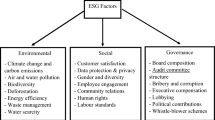Abstract
Since the separation of ownership and control rights, there have been a series of corporate agency problems. As a common agency problem, managerial perks has certain objectivity and inevitability. This paper focused on the influence of excess perks on firm value in different life cycle stages. The research object of this paper was the A-share listed companies in Shanghai and Shenzhen from 2011 to 2020. After empirical analysis, the conclusions were drawn: (1) Executives’ excess perks has a significantly positive impact on firm value in the growth and maturity stages; (2) Executives’ excess perks has a significantly negative impact on firm value in the decline stage. The research conclusions of this paper provide important reference for firm management governance and decision-making in different life cycle stages, aiming to make contributions to enhancing firm value and promoting sustainable development of firms.
Access this chapter
Tax calculation will be finalised at checkout
Purchases are for personal use only
Similar content being viewed by others
References
Adithipyangkul, P., Alon, I., Zhang, T.: Executive perks: compensation and corporate performance in China. Asia Pac. J. Manage. 28(2), 401–425 (2011)
Adizes, I.: Corporate LifeCycles: How and Why Corporations Grow and Die and What to Do about it (1990)
Ai, J.: Guanxi networks in China: its importance and future trends. Chin. World. Econ. 14(5), 105–118 (2006)
Chen, D., Li, O.Z., Liang, S.: Do Managers Perform for Perks? (2009). Available at SSRN 1464015
Dickinson, V.: Cash flow patterns as a proxy for firm life cycle. Account. Rev. 86(6), 1969–1994 (2011)
Chen, D.H., Liang, S.K., Jiang, D.Q.: How marketization affects incentive contract costs and choices: perks or monetary compensations? Acc. Res. 11, 56–64 (2010). (in Chinese)
Esqueda, O.A., OConnor, T.: Corporate governance and life cycles in emerging markets. Res. Int. Bus. Financ. 51, 101077 (2020)
Habib, A., Hasan, M.M.: Corporate life cycle research in accounting, finance and corporate governance: a survey, and directions for future research. Int. Rev. Financ. Anal. 61, 188–201 (2019)
Harjoto, M.A., Jo, H.: CEO power and firm performance: a test of the life-cycle theory. Asia Pac. J. Financ. Stud. 38(1), 35–66 (2009)
Helfat, C.E., Peteraf, M.A.: The dynamic resource-based view: capability lifecycles. Strateg. Manag. J. 24(10), 997–1010 (2003)
Hribar, P., Yehuda, N.: The mispricing of cash flows and accruals at different life-cycle stages. Contemp. Account. Res. 32(3), 1053–1072 (2015)
Huan, L., Gaoping, Z., Dan, L.: Do big customers influence listed firms performance? Based on supplier-customer relationships in china. Chin. J. Acc. Stud. 5(3), 326–343 (2017). (in Chinese)
Jawahar, I., McLaughlin, G.L.: Toward a descriptive stakeholder theory: an organizational life cycle approach. Acad. Manag. Rev. 26(3), 397–414 (2001)
Jensen, M.C., Meckling, W.H.: Theory of the firm: managerial behavior, agency costs and ownership structure. J. Financ. Econ. 3(4), 305–360 (1976)
Jian, C., Jun, C.: Individual governance effect of audit supervision under strict supervision atmospherełła study based on the excess perk of local soes’ executives. Econ. Theor. Bus. Manage. 41(5), 85 (2021). (in Chinese)
Lau, C.M.: Team and organizational resources, strategic orientations, and firm performance in a transitional economy. J. Bus. Res. 64(12), 1344–1351 (2011)
Li, Y., Qin, Y.H., Huang, J.C.: Perks, workers’ wages and firm performance. J. Finan. Trade Econ. 7, 60–68 (2010). (in Chinese)
Li, Y.L., Tan, M.Z.: Accounting information transparency and firm value: retesting based on life cycle theory. J. Acc. Res. 10, 27–33 (2019). (in Chinese)
Li, Y., Li, Z., Tang, S.: Corporate life-cycle corporate governance and corporate capital allocation efficiency. Nankai Bus. Rev. 3, 110–121 (2011). (in Chinese)
Liu, P., Chen, W.Z.: The choice of different modes of enterprise life cycle and governance mechanism. J. Acc. Res. 5, 73–76 (2003). (in Chinese)
Luo, W., Zhang, Y., Zhu, N.: Bank ownership and executive perquisites: new evidence from an emerging market. J. Corp. Finan. 17(2), 352–370 (2011)
Miller, D., Friesen, P.H.: A longitudinal study of the corporate life cycle. Manage. Sci. 30(10), 1161–1183 (1984)
Quan, X., Wu, S., Wen, F.: Managerial power, private income and compensation rigging. Econ. Res. J. 11(1), 73–87 (2010). (in Chinese)
Xin, L., Zhang, M.: Enterprise absorptive capability, capital structure and corporation valueła case study of listed companies of strategic emerging industries in the Yangtze river economic zone. Acc. Res. 9, 47–55 (2018). (in Chinese)
Yoo, J., Lee, S., Park, S.: The effect of firm life cycle on the relationship between r &d expenditures and future performance, earnings uncertainty, and sustainable growth. Sustainability 11(8), 2371 (2019)
Zhang, X.P., Gao, P.: The contagion effect of corporate financial behavior: an empirical evidence from perquisites. J. Central Univ. Finan. Econ. 10, 68–80 (2019). (in Chinese)
Hammermann, A., Mohnen, A.: Who benefits from benefits? Empirical research on tangible incentives. RMS 8(3), 327–350 (2014)
Rajan, R.G., Wulf, J.: Are perks purely managerial excess? J. Financ. Econ. 79(1), 1–33 (2006)
Yermack, D.: Flights of fancy: corporate jets, CEO perquisites, and inferior shareholder returns. J. Financ. Econ. 80(1), 211–242 (2006)
Author information
Authors and Affiliations
Corresponding author
Editor information
Editors and Affiliations
Rights and permissions
Copyright information
© 2022 The Author(s), under exclusive license to Springer Nature Switzerland AG
About this paper
Cite this paper
Wang, Y., Liu, Z., Zhou, C., Manzoor, A. (2022). Research on the Influence of Excess Perks on Firm Value: Based on the Perspective of Life Cycle Theory. In: Xu, J., Altiparmak, F., Hassan, M.H.A., García Márquez, F.P., Hajiyev, A. (eds) Proceedings of the Sixteenth International Conference on Management Science and Engineering Management – Volume 2. ICMSEM 2022. Lecture Notes on Data Engineering and Communications Technologies, vol 145. Springer, Cham. https://doi.org/10.1007/978-3-031-10385-8_3
Download citation
DOI: https://doi.org/10.1007/978-3-031-10385-8_3
Published:
Publisher Name: Springer, Cham
Print ISBN: 978-3-031-10384-1
Online ISBN: 978-3-031-10385-8
eBook Packages: Intelligent Technologies and RoboticsIntelligent Technologies and Robotics (R0)




